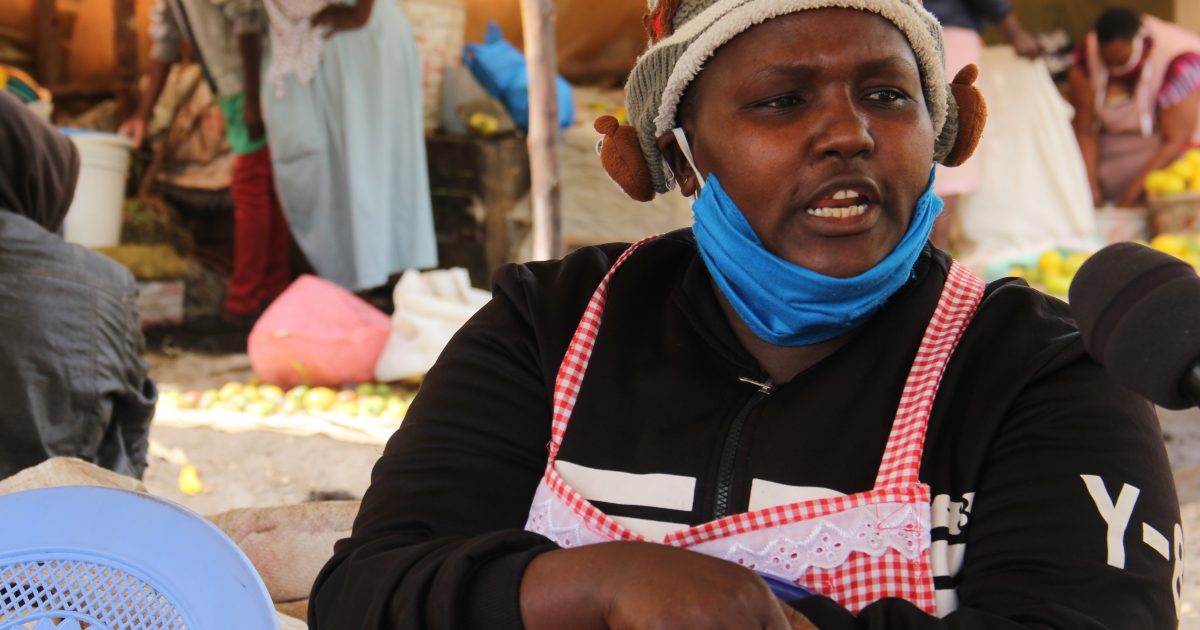As Kenyans grapple with economic shocks following outbreak and spread of coronavirus pandemic heavy rains witnessed in Nakuru have come with sorts of relief following increased supply of African Indigenous Vegetables (AIVS) at various food outlets and markets in the region.
A spot check at main farm produce outlets at Afraha Stadium, Ponda Mali, Soko Mjinga and Kaptembwa open air markets established that demand for jute mallow (murenda), vegetable cowpea (kunde), African nightshade (managu), spider plant (saget), pumpkin leaves (Lisebebe) and African kale (kanzira) had superseded that of Sukuma wiki, Spinach and cabbage.
Mary Nyambura, 42 a fruit and vegetable vendor at the Afraha open air market sought to explain the surge in demand by stating that African Indigenous Vegetables had a ‘longer shelf life’ and could be relied on as ‘food stock’ in the current hard economic times posed by the Covid 19 pandemic.
“It is easier to add value and preserve for longer periods African Indigenous Vegetables through processes like drying and fermentation which is somewhat impossible with regard to exotic vegetables such as Sukuma Wiki, Spinach and Cabbages.
With current hard economic times people need food stuffs with a longer shelf life and high nutritional content. These vegetables are also very affordable as we sell a bunch of African nightshade (managu) for only Sh 10,” she explained.
Jane Mureithi, vegetable vendor at the Afraha Open air market noted that though the African Indigenous Vegetables were plentiful in the wild from open fields, homesteads and forests, there was need for research agencies, local universities and seed companies to multiply and distribute high quality planting material as the crops were reputed as being high yielding, disease and drought tolerant and have high nutritional value.
Paul Wanyoike, a 57 year old father of three and a resident of Mchangaa Estate in Rongai Sub-County said his family had resorted to African Indigenous Vegetables due to their adaptability to climate change, affordability and high nutritional content.
“Previously I used to grow Sukuma and Spinach on my half an acre piece of land because I could afford herbicides and fertilizers that the exotic crops require. Once Covid-19 broke out I rarely find casual jobs at construction site.
I now grow vegetable cowpea (kunde), African nightshade (managu) and spider plant (saget) at the piece of land as they are less prone to pest and disease attacks, tolerate extremes in rainfall and temperatures and besides offering my family food security save me from financial losses” explained Wanyoike.
He said that AIVS require less farm input in terms of herbicides and fertilizers, have high nutrient content and medicinal value and grow faster giving consumers and farmers additional benefits.
Justus Momanyi, the proprietor of Mang’oa Highway Travelers’ Resort said most of his clients prefer their Nyama Choma to be supplemented with African Traditional Vegetables which he sources from Dundori and far flung areas as Kisii and Kakamega.
The retired High School Principal said there is need for policy shift that will encourage Kenyans to embrace traditional crops while ensuring availability of seeds to farmers and linking them to the markets.
“The food security conversation should not be about maize only. If farmers have high quality seed and technology, they can grow these African Indigenous vegetables as a source of income.
These indigenous vegetables such like Amaranth (terere/tsimboka) have been ignored by researchers since they are viewed as economically insignificant in the global market. Policy makers need to prioritize commercialization Africa of Indigenous Vegetables (AIVs) and the sensitization of communities about the AIVs,” observed Momanyi.
Peter Mbuthia, the proprietor of Tyrus Food Kiosk within the Nakuru Central Business District offered that the indigenous vegetables are becoming more popular because they contain a lot of vitamins, minerals and anti-oxidants which help in curing or preventing some non-communicable diseases.
“The supply of the vegetables has not been disrupted even as Covid-19 exerts a beating on most business enterprises. Our clients prefer the vegetables as they are fresh from the farm and highly unlikely to have chemical traces from herbicides and pesticides,” stated Mbuthia.
AIV farmers in Nakuru sell the vegetables directly to supermarkets, hotels, schools and hospitals. Majority of them sell at open non-shaded and closed markets.
According to Prof. Mary Oyiela Abukutsa-Onyango a respected authority on AIVS and who has published over 20 peer-reviewed scientific articles on AIVs Sukuma wiki, an exotic vegetable that was brought to Kenya as cattle feed during colonial period, has little nutritive value.
“Murenda is 20 times more nutritious than cabbages while and five times more than sukuma wiki. Despite the many benefits that traditional vegetables carry, Kenyans are wildly attached to old sukuma wiki” said Prof. Abukutsa, a Professor of Horticulture and Deputy Vice Chancellor, Research, Production and Extension at the Jomo Kenyatta University of Agriculture and Technology.
The Director Crop Systems at KALRO, Lusike Wasilwa attributed low supply of AIVs to several factors including poor quality seeds, low soil fertility, water scarcity and unreliable rainfall resulting in the vegetables not being readily available during certain months when it is dry.
“We actively train farmers on how to monitor weather and to invest in rain water harvesting and efficient irrigation methods like drip and sprinkler. They are also advised to apply mulch to their vegetable garden, adopt organic remedies for pest control, apply integrated pest management to reduce environmental damage and use certified seed varieties” said the Director, Crop Systems at KALRO.
The Kenya Plant Health Inspectorate Service (KEPHIS) she said has given clearance to development of certified seeds for AIVS and that farmer now have an opportunity to plant the crops for subsistence, commercial and export markets.
“Interest in African Indigenous Vegetables has been rekindled globally. We have seen hundreds of researchers from German and United States pitch tent in the country and conduct extensive research on AIVS.
It is not farfetched to be worried that they will eventually take the skill of cultivating AIVS to their countries and starting exporting the vegetables to Kenya and other African countries” affirmed Professor Wasilwa.
Prof. Abukutsa said drumming up support for AIVs through “advocacy and promotion, oral media (poems, songs), exhibitions and media would be crucial in increasing the demand for the vegetables while educating the masses about the available options.
The World Health Organization recommends that each person should consume at least 73kgs of vegetables and fruits per year for optimal nutrition and health, “she explains.
By David Mururia/Anne Mwale




